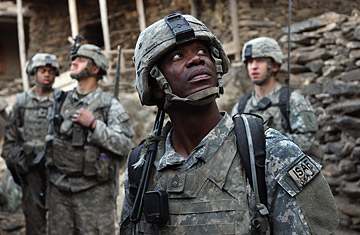
SFC Thomas Wright scans the hills for Taliban insurgents in the Korengal Valley of eastern Afghanistan.
For the past two years, Barack Obama's behind-closed-doors morning briefings have dealt with his battles against Hillary Clinton, John McCain and other political rivals on the road to the presidency. But starting Thursday morning, those morning meetings will concern two more intractable foes: America's enemies in Afghanistan and Iraq, along with whatever other intelligence droppings the nation's spies have gleaned overnight. The hour-long CIA briefings are an early-morning ritual for Presidents, and they will begin for Obama even before he has named the national-security team — the Secretaries of Defense and State, and the National Security Adviser — who will ultimately have to act on the contents of those intelligence briefings. It's all a part of the slow-motion handoff over the coming seven weeks, as President Bush packs up to return to Texas and his successor prepares to move into the Oval Office. Both men will get near-identical briefings during the transition.
Within hours of Obama's election, global trouble spots were vying for the President-elect's attention. "This is my first demand of the new President of the United States — to put an end to civilian casualties," Afghan President Hamid Karzai said Wednesday in Kabul, following reports that a U.S. bombing in southern Afghanistan Monday killed 37 people at a wedding party, most of them women and children.
Pakistan's prime minister warned that the Pentagon must end its missile strikes against militants on Pakistani soil along the Afghan border, or risk losing its war on terror. "No matter who the President of America will be," Yousuf Raza Gilani told the AP earlier this week, continued strikes will fuel "anti-American sentiments." Such ire could doom Washington's efforts to rid Pakistan's lawless frontier of the Taliban and al-Qaeda forces that regularly launch attacks on U.S. and NATO forces in nearby Afghanistan. Highlighting how Afghanistan has eclipsed Iraq as a strategic issue, Baghdad didn't demand anything more of Obama than, in the words of a government statement, to work together to achieve "security and stability in Iraq, to preserve its sovereignty and protect its people's interests."
While getting up to speed on the complexity of the international challenges he will face, Obama will start filling the senior national-security posts in the new Administration. Candidates for secretary of state are believed to include former U.N. ambassador Richard Holbrooke and Chuck Hagel, a GOP senator from Nebraska who did not seek re-election and has been critical of the war in Iraq. A spokeswoman for John Kerry denied rumors that the Massachusetts senator and failed 2004 presidential nominee was also seeking the job. In the running to serve as Obama's national security adviser are James Steinberg, who served as Clinton's deputy national security adviser, and James Jones, a retired Marine commandant and former top NATO commander who has been highly critical of the Bush Administration's Afghan policy.
Obama's biggest immediate challenge overseas will be to scale back the 150,000 U.S. troop contingent now in Iraq, and shift some of them to reinforce the 32,000 American soldiers now in Afghanistan. While national-security experts agree such a shift needs to happen, the key question is its timing. If U.S. forces are pulled out of Iraq too soon, U.S. commanders there argue, the fragile gains achieved the over the past 18 months could erode, and ultimately bring on a civil war. Obama has said he would like to pull up to 10,000 troops a month from Iraq, a rate some military officers say is too high.
The chances are said to be about 50-50 that Obama will ask Defense Secretary Robert Gates to remain in his position, at least for the first year of the new Administration. Backers of such a move say the new commander-in-chief could use the continuity Gates would offer, but critics counter that keeping him on could delay Obama's promised U.S. troop pullout from Iraq and fail to signal a clear break from Bush's policy.
Should Gates be passed over or decline to continue serving, former Clinton Navy Secretary Richard Danzig is a leading contender to run the Pentagon. And Danzig made clear last month where an Obama Administration might lean in the wars currently underway. Iraq in "now a political problem; security and the presence of military is important, but we need to get the Iraqis catalyzed to come to grips with handling front line combat issues themselves," said Danzig in a breakfast with reporters. While the Pentagon must begin "moving additional combat brigades to Afghanistan," Danzig stressed that "there are opportunities to use capabilities besides military power in Afghanistan that have been underdeveloped in Administration policy up until now."
The U.S.-led efforts to rebuild the Afghan army and the country's infrastructure have lagged because not enough resources have been devoted to them, he argued. That's because the Administration has relied too much on tanks, and not enough on steamrollers. More paved roads could be built more quickly if more Afghans were hired to build them. "It's quite true that Taliban use the roads as well, but it's harder to implant an IED on a paved road than it is on a gravel road," Danzig said. Such improvements also could convince Afghan farmers to plant their fields with something other than opium poppies — the taxing of which has been a key source of funds for the Taliban. "You make it possible," Danzig said, "for farmers to get alternative crops to market in ways that are very difficult absent paved roads."
As he'll be discovering starting Thursday, the condition of Afghanistan's rural highways are now as much part of Barack Obama's responsibility as the state of Main Street America.
